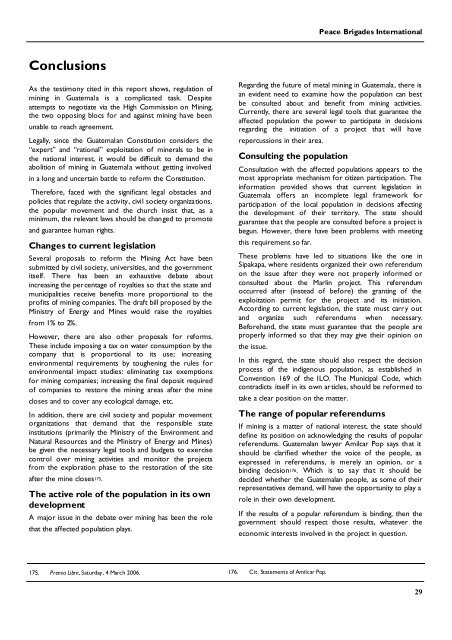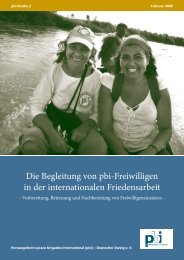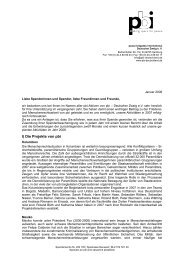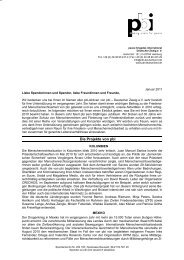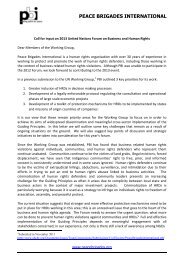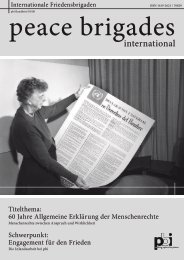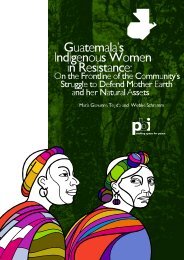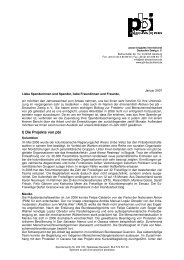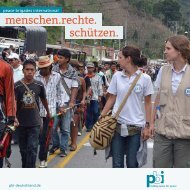Metal Mining and Human Rights in Guatemala - Peace Brigades ...
Metal Mining and Human Rights in Guatemala - Peace Brigades ...
Metal Mining and Human Rights in Guatemala - Peace Brigades ...
- No tags were found...
Create successful ePaper yourself
Turn your PDF publications into a flip-book with our unique Google optimized e-Paper software.
<strong>Peace</strong> <strong>Brigades</strong> InternationalConclusionsAs the testimony cited <strong>in</strong> this report shows, regulation ofm<strong>in</strong><strong>in</strong>g <strong>in</strong> <strong>Guatemala</strong> is a complicated task. Despiteattempts to negotiate via the High Commission on <strong>M<strong>in</strong><strong>in</strong>g</strong>,the two oppos<strong>in</strong>g blocs for <strong>and</strong> aga<strong>in</strong>st m<strong>in</strong><strong>in</strong>g have beenunable to reach agreement.Legally, s<strong>in</strong>ce the <strong>Guatemala</strong>n Constitution considers the“expert” <strong>and</strong> “rational” exploitation of m<strong>in</strong>erals to be <strong>in</strong>the national <strong>in</strong>terest, it would be difficult to dem<strong>and</strong> theabolition of m<strong>in</strong><strong>in</strong>g <strong>in</strong> <strong>Guatemala</strong> without gett<strong>in</strong>g <strong>in</strong>volved<strong>in</strong> a long <strong>and</strong> uncerta<strong>in</strong> battle to reform the Constitution.Therefore, faced with the significant legal obstacles <strong>and</strong>policies that regulate the activity, civil society organizations,the popular movement <strong>and</strong> the church <strong>in</strong>sist that, as am<strong>in</strong>imum, the relevant laws should be changed to promote<strong>and</strong> guarantee human rights.Changes to current legislationSeveral proposals to reform the <strong>M<strong>in</strong><strong>in</strong>g</strong> Act have beensubmitted by civil society, universities, <strong>and</strong> the governmentitself. There has been an exhaustive debate about<strong>in</strong>creas<strong>in</strong>g the percentage of royalties so that the state <strong>and</strong>municipalities receive benefits more proportional to theprofits of m<strong>in</strong><strong>in</strong>g companies. The draft bill proposed by theM<strong>in</strong>istry of Energy <strong>and</strong> M<strong>in</strong>es would raise the royaltiesfrom 1% to 2%.However, there are also other proposals for reforms.These <strong>in</strong>clude impos<strong>in</strong>g a tax on water consumption by thecompany that is proportional to its use; <strong>in</strong>creas<strong>in</strong>genvironmental requirements by toughen<strong>in</strong>g the rules forenvironmental impact studies: elim<strong>in</strong>at<strong>in</strong>g tax exemptionsfor m<strong>in</strong><strong>in</strong>g companies; <strong>in</strong>creas<strong>in</strong>g the f<strong>in</strong>al deposit requiredof companies to restore the m<strong>in</strong><strong>in</strong>g areas after the m<strong>in</strong>ecloses <strong>and</strong> to cover any ecological damage, etc.In addition, there are civil socie ty <strong>and</strong> popular movementorganizations that dem<strong>and</strong> that the responsible state<strong>in</strong>stitutions (primarily the M<strong>in</strong>istry of the Environment <strong>and</strong>Natural Resources <strong>and</strong> the M<strong>in</strong>istry of Energy <strong>and</strong> M<strong>in</strong>es)be given the necessary legal tools <strong>and</strong> budgets to exercisecontrol over m<strong>in</strong><strong>in</strong>g activities <strong>and</strong> monitor the projectsfrom the exploration phase to the restoration of the siteafter the m<strong>in</strong>e closes175.The active role of the population <strong>in</strong> its owndevelopmentA major issue <strong>in</strong> the debate over m<strong>in</strong><strong>in</strong>g has been the rolethat the affected population plays.Regard<strong>in</strong>g the future of metal m<strong>in</strong><strong>in</strong>g <strong>in</strong> <strong>Guatemala</strong>, there isan evident need to exam<strong>in</strong>e how the population can bestbe consulted about <strong>and</strong> benefit from m<strong>in</strong><strong>in</strong>g activities.Currently, there are several legal tools that guarantee theaffected population the power to participate <strong>in</strong> decisionsregard<strong>in</strong>g the <strong>in</strong>itiation of a project that will haverepercussions <strong>in</strong> their area.Consult<strong>in</strong>g the populationConsultation with the affected populations appears to themost appropriate mechanism for citizen participation. The<strong>in</strong>formation provided shows that current legislation <strong>in</strong><strong>Guatemala</strong> offers an <strong>in</strong>complete legal framework forparticipation of the local population <strong>in</strong> decisions affect<strong>in</strong>gthe development of their territory. The state shouldguarantee that the people are consulted before a project isbegun. However, there have been problems with meet<strong>in</strong>gthis requirement so far.These problems have led to situations like the one <strong>in</strong>Sipakapa, where residents organized their own referendumon the issue after they were not properly <strong>in</strong>formed orconsulted about the Marl<strong>in</strong> project. This referendumoccurred after (<strong>in</strong>stead of before) the grant<strong>in</strong>g of theexploitation permit for the project <strong>and</strong> its <strong>in</strong>itiation.Accord<strong>in</strong>g to current legislation, the state must carry out<strong>and</strong> organize such referendums when necessary.Beforeh<strong>and</strong>, the state must guarantee that the people areproperly <strong>in</strong>formed so that they may give their op<strong>in</strong>ion onthe issue.In this regard, the state should also respect the decisionprocess of the <strong>in</strong>digenous population, as established <strong>in</strong>Convention 169 of the ILO. The Municipal Code, whichcontradicts itself <strong>in</strong> its own articles, should be reformed totake a clear position on the matter.The range of popular referendumsIf m<strong>in</strong><strong>in</strong>g is a matter of national <strong>in</strong>terest, the state shoulddef<strong>in</strong>e its position on acknowledg<strong>in</strong>g the results of popularreferendums. <strong>Guatemala</strong>n lawyer Amilcar Pop says that itshould be clarified whether the voice of the people, asexpressed <strong>in</strong> referendums, is merely an op<strong>in</strong>ion, or ab<strong>in</strong>d<strong>in</strong>g decision176. Which is to say that it should bedecided whether the <strong>Guatemala</strong>n people, as some of theirrepresentatives dem<strong>and</strong>, will have the opportunity to play arole <strong>in</strong> their own development.If the results of a popular referendum is b<strong>in</strong>d<strong>in</strong>g, then thegovernment should respect those results, whatever theeconomic <strong>in</strong>terests <strong>in</strong>volved <strong>in</strong> the project <strong>in</strong> question.175. Prensa Libre, Saturday, 4 March 2006. 176. Cit. Statements of Amilcar Pop.29


